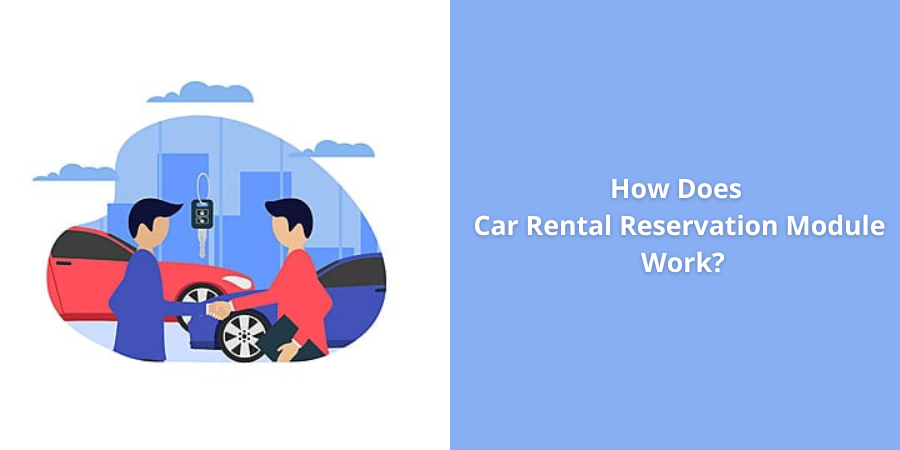Car rental services offer customers the flexibility to book cars with just a click of a button from a mobile app or desktop. It looks pretty simple, but there is a systematic process that takes place in the background. This process or system, known as the car reservation module, enables customers to book cars online, make payments, and inspect them when returned.
The car reservation module is a web-based car reservation system that is designed for customers to make quick car bookings. It also helps rental agencies, car operators, taxi rental operators, etc., to manage things around car bookings. There is an endless list of car rental software but finding the right car rental reservation system that suits the business model is the key to success.
From customers end
- Make payment
- Book a car
- Change the car type or model
- Cancel a booking
- Contact customer care
From the Car rental operators’ end
- Manage car reservation
- Configure payment gateway
- Manage car inventory
- Generate reservation report
- Track vehicle geographic location
- Manage customer vouchers
- Generate bill
- Transaction history
How Does a Car Rental Reservation Module Work?
The car rental reservation module has multiple components that work together to book rental cars on demand and manage the car rental business seamlessly.
- Car rental booking engine: A car rental engine is the critical component of a Car Rental Reservation System. The system is synched with payment gateway, car inventory, fleet management, and customer management. When customers reserve a car through the website, the car rental booking engine initiates the booking process and uses all these components to facilitate the smooth booking of the rental cars.
- Inventory database: As soon as customers visit the website and search for rental cars, the inventory database fetches the list of the cars and presents them in front of the customers with the price quote.
- Payment gateway: The booking system accepts payments through the payment gateway and generates invoices. The system provides the option for payment, such as debit cards, credit cards, or third-party payment apps. It also keeps a record of customers’ pending payments. Once the payment is done, the car rental system sends a confirmation notification to the customers.
- CRM (Customer Relationship Management): CRM management in the car rental reservation module keeps the customers’ data organized and in order. The moment customers interact with the car rental booking system, all the details of the customers are saved in a database. So whenever customers book a car from the website, it populates their favorite cars, preferred price range, discount offers, etc., based on their previous history.
- Fleet management: Fleet management helps to track various details of vehicles such as the number of cars, maintenance status, inspection, insurance expiration date, etc.
- Agents task management: While the car rental reservation module on the front helps customers with car booking, behind the reception, it allows service agents to perform their duties efficiently. They can have a holistic view of the entire booking process, from serving customers to receiving payment and taking inspection. With all this information in hand, agents can have better visibility of their work and enhance their efficiency.
How Investing In a Car Rental Reservation System Makes Rental Car Business Profitable?
The car rental reservation system provides details about the real-time availability of cars and allows the distribution of cars evenly. It reduces the downtime in the service, and in case of breakdown, it automatically assigns the nearby available car. In addition to that, agents can see the car rental activities through their dashboard, such as return date, cars under maintenance, current car occupancy, etc., and serve customers with quality service. It increases customer satisfaction and eventually brings more business.
It also supports multi-currency transactions and payment options, which helps to improve the cash flow. The automation feature in the application is a big advantage as it helps to save labor costs and boost employees’ productivity. Besides that, the car rental reservation system operates 24X7, and business owners can see revenue growth even when their physical location runs at standard working hours. Advanced car rental systems are laced with telematics and tap on attributes like heat, fuel consumption, engine vibration, etc. Any abnormal behavior or fluctuation in the metrics is scheduled for maintenance work. Timely maintenance can prevent total loss and extend the car serving period. Further, the car rental reservation system can use data analytics to monitor business performance and identify more business opportunities. So, investing in a car rental reservation system certainly helps in increasing business profitability.
Conclusion
The car rental business is pretty promising but highly scattered and unorganized. The car rental owners who want to excel in this business and yield high profits must refine their approaches. They need to become more resilient and accountable. They should implement a strategy that optimizes their efficiency and adds value to the customer. By utilizing digital resources and tools, business owners can reach more customers and become organized. Particularly, the car rental reservation system facilitates users to manage online reservations and fine-tune the entire car rental process. It maximizes the return on investment and reduces overhead costs. If you are a car rental operator focused on offering fast and affordable car rental services, then choosing the right car rental business is critical.



